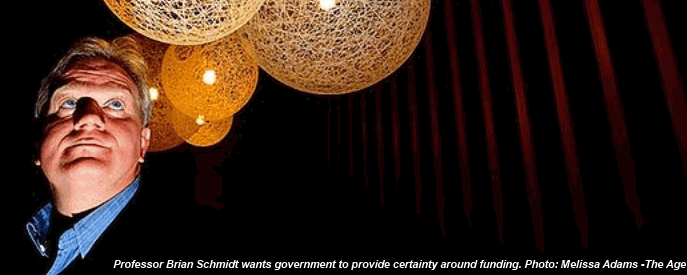|
Nobel Laureate Brian
Schmidt as reported in The Australian
It will "lapse into obsolescent irrelevancy"
because of short-termism in research planning.
"The situation has become truly dire," he told a Parliament House forum
on Monday. "I reckon we have less than 12 months to sort something
sensible out.
"But there is no ability to commit to long-term research infrastructure,
and negotiations on these facilities happen years in advance. I do not
want a band-aid just because I'm a Nobel prizewinner for astronomy.
"I want a landscape where strategic decisions are made in this country
rather than things just happening.
"A long-term strategic investment in R&D pays a huge dividend. It's not
surprising that Australian researchers struggle to translate their
research into economic returns when most are stuck in volatile one to
three-year funding cycles.
"for [the strategic research framework being drafted by chief scientist
Ian Chubb] to be useful such a framework needs to be adopted and acted
upon not just for a year but a decade."
|
Brian Schmidt and AAS's Bob Williamson as reported in The Age
Astrophysicist Brian
Schmidt says he will be forced to abandon the research that won him a
Nobel prize unless Australia secures access to the latest generation of
telescopes.
"The astronomy that I do and won me the Nobel
prize will not be possible in Australia unless this is sorted out,
"A strategic plan means we get the biggest bang for dollars spent
"This money we spend is going to be used to grow the economic future of
the nation through innovation."
And Professor Williamson: "Many of the most important research programs
such as cancer and astronomy require a national commitment of at least
five to 10 years.
"We have to guarantee that the future of research is seen as a strategic
asset so when the minerals run out, we have our scientific and technical
excellence in place.
|
Simon Marginson's OP-Ed in The Australian
"In the last seven
months Labor has taken $3.8 billion off the forward estimates for higher
education and research.
"Mr Abbott, has refused to rule out further cuts to teaching and
research support.
"According to the OECD, in 2010 Australia spent 0.7 per cent of its GDP
on public funding of tertiary education, compared to an OECD country
average of 1.1 per cent. The difference is $6 billion per year at
today’s prices.
"[A]ccording to the forward estimates in the budget, public funding of
higher education drops to 0.54 per cent of GDP by 2016-17.
"The December 2011 review report recommended higher subsidies in most
disciplines. The government sat on the report for fourteen months and
then trashed it. By then Cabinet was committed to disinvestment.
"In 2011 higher education institutions on the public schedule received
$4.12 billion in international student fees, 17.4 per cent of revenues
from continuing operations.
"Whether international student income rises or falls in future, gone are
the days when international students could be cranked up by 10-15 per
cent whenever needed to fill the gap in public funding.
|
![]() If Universities Were Mines Would They Be Loved and Wanted? (June 20,
2013)
If Universities Were Mines Would They Be Loved and Wanted? (June 20,
2013)